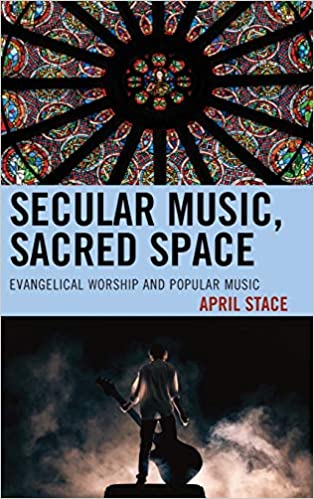by April Stace – Lexington Books

Learn more and purchase from:
Easter Sunday, 2009, was the Sunday heard ‘round the evangelical internet: NewSpring Church, the second-largest church in the Southern Baptist Convention and among the top one hundred largest churches in the US, had begun their service with the song “Highway to Hell” by hard rock band AC/DC. They had brazenly crossed the sacred/secular musical divide on the most important Sunday of the year, and commentary abounded on the value of such a step. Many were offended at the “desecration” of such a holy day, deriding Newspring as the “theater of the absurd.” Others cheered NewSpring’s engagement with “the culture” and suggested that music could be used to convert non-Christians. No mere debate over stylistic preferences, many expressed that foundational aspects of evangelical identity were at stake.
While many books have been written about religious music that utilizes popular music styles (a.k.a. “contemporary Christian music”), there has yet to be a scholarly treatment of how and why popular, secular music is utilized by churches. This book addresses that lacuna by examining this emerging trend in evangelical and “emerging” churches in America. What is the motivation behind using music that seemingly has no connection to Christian theology, values, or themes—such as music by Katy Perry, AC/DC, or Van Halen—and what can we learn about post-denominational evangelical churches in America by uncovering these motives?
In this book, April Stace uncovers several themes from an ethnographic study of these churches: the increasingly-porous boundary between the sacred and the secular, the importance placed on “authenticity” in contemporary American culture, how evangelicals are responding to what they perceive is an increasingly-secular society, the “turn to the subject” of contemporary culture, the desire to leave a space for expression of doubt in the worship service without fully authorizing that doubt, and the individualization of the construction of religious identity in the modern era.
Liturgical scholars, seminary students, clergy and ethnographers focused on Christian worship should engage with Stace’s thoughtful work. For worship educators, her research could provide helpful case studies for use in seminaries and bible schools. In addition, many of the questions emerging from this study regarding culture and Christian identity would be beneficial discussion starters for pastors and worship leaders. Overall, Stace presents an accessible ethnographic work that brings clarity to a controversial, yet important topic., Evangelical Quarterly
Since the 1960s, relevance, intelligibility, and accessibility have been highly esteemed values within new styles of Protestant worship. Stace’s book provides an indispensable study of one intriguing expression of those values: the use of popular-secular music within Christian worship. Stace uses “Highway to Hell” to provide a pathway to knowledge. — Lester Ruth, Duke Divinity School
Unafraid of controversial subject matter, Stace dives in head first, calling things like she sees them. Whether you agree with her conclusions or not, you will admit that you have been in conversation with a seasoned scholar. — Rev. Dr. William Bradley Roberts, Virginia Theological Seminary, Consultant in the Center for Liturgy and Music
Stace mixes a narrow research question—why are church leaders choosing to use popular-secular music in worship?—with an ethnographic study of leaders of eight churches to produce a fascinating and nuanced study of the current permeability of boundaries between sacred/secular, religious/spiritual, church/culture, and individual/church. This book is full of insights into the contemporary worship and religious/spiritual landscape of the United States today. — Rev. Dr. Robin Knowles Wallace, Methodist Theological School
